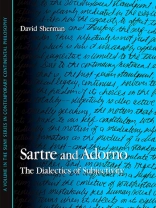Systematic comparison of Sartre and Adorno that focuses on their theories of the subject.
Focusing on the notion of the subject in Sartre’s and Adorno’s philosophies, David Sherman argues that they offer complementary accounts of the subject that circumvent the excesses of its classical formation, yet are sturdy enough to support a concept of political agency, which is lacking in both poststructuralism and second-generation critical theory. Sherman uses Sartre’s first-person, phenomenological standpoint and Adorno’s third-person, critical theoretical standpoint, each of which implicitly incorporates and then builds toward the other, to represent the necessary poles of any emancipatory social analysis.
สารบัญ
Acknowledgments
Abbreviations Used in the Text and Notes
Introduction
Part I. Adorno ’ s Relation to the Existential and Phenomenologicial Traditions
1. Adorno and Kierkegaard
Adorno’s Critique of Kierkegaard
Adorno’s Kierkegaardian Debt
2. Adorno and Heidegger
Adorno’s Critique of Heidegger
Adorno and Heidegger Are Irreconcilable
3. Adorno and Husserl
Part II. Subjectivity in Sartre ’ s Existential Phenomenology
4. The Frankfurt School’s Critique of Sartre
Adorno on Sartre
Marcuse’s Critique of
Being and Nothingness
5. Sartre’s Relation to His Predecessors in the Phenomenological and Existential Traditions
Being
Knowing
Death
6. Sartre’s Mediating Subjectivity
Sartre’s Decentered Subject and Freedom
Being-for-Others: The Ego in Formation
Bad Faith and the Fundamental Project
Situated Freedom and Purified Reflection
Part III. Adorno ’
s Dialectic of Subjectivity
7. The (De)Formation of the Subject
The Dawn of the Subject
Science, Morality, Art
Adorno, Sartre, Anti-Semitism, and Psychoanalysis
8. Subjectivity and Negative Dialectics
Freedom Mode
History Model
Negative Dialectics, Phenomenology, and Subjectivity
Notes
Bibliography
Index
เกี่ยวกับผู้แต่ง
David Sherman is Associate Professor of Philosophy at the University of Montana at Missoula and is the coauthor (with Leo Rauch) of Hegel’s Phenomenology of Self-Consciousness: Text and Commentary, also published by SUNY Press.












